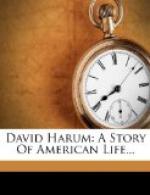“I hain’t never cared to say much about it to Polly,” he remarked, “though fer that matter Jim Bixbee, f’m all accounts, was about as poor a shack as ever was turned out, I guess, an’—”
John took advantage of the slight hesitation to interpose against what he apprehended might be a lengthy digression on the subject of the deceased Bixbee by saying:
“You were quite a young fellow when you were married, I infer.”
“Two or three years younger ’n you be, I guess,” said David, looking at him, “an’ a putty green colt too in some ways,” he added, handing over the reins and whip while he got out his silver tobacco box and helped himself to a liberal portion of its contents. It was plain that he was in the mood for personal reminiscences.
“As I look back on’t now,” he began, “it kind o’ seems as if it must ‘a’ ben some other feller, an’ yet I remember it all putty dum’d well too—all but one thing, an’ that the biggist part on’t, an’ that is how I ever come to git married at all. She was a widdo’ at the time, an’ kep’ the boardin’ house where I was livin’. It was up to Syrchester. I was better lookin’ them days ’n I be now—had more hair at any rate—though,” he remarked with a grin, “I was alwus a better goer than I was a looker. I was doin’ fairly well,” he continued, “but mebbe not so well as was thought by some.
“Wa’al, she was a good-lookin’ woman, some older ’n I was. She seemed to take some shine to me. I’d roughed it putty much alwus, an’ she was putty clever to me. She was a good talker, liked a joke an’ a laugh, an’ had some education, an’ it come about that I got to beauin’ her ’round quite a consid’able, and used to go an’ set in her room or the parlor with her sometimes evenin’s an’ all that, an’ I wouldn’t deny that I liked it putty well.”
It was some minutes before Mr. Harum resumed his narrative. The reins were sagging over the dashboard, held loosely between the first two fingers and thumb of his left hand, while with his right he had been making abstracted cuts at the thistles and other eligible marks along the roadside.
“Wa’al,” he said at last, “we was married, an’ our wheels tracked putty well fer quite a consid’able spell. I got to thinkin’ more of her all the time, an’ she me, seemin’ly. We took a few days off together two three times that summer, to Niag’ry, an’ Saratogy, an’ ‘round, an’ had real good times. I got to thinkin’ that the state of matrimony was a putty good institution. When it come along fall, I was doin’ well enough so ‘t she could give up bus’nis, an’ I hired a house an’ we set up housekeepin’. It was really more on my account than her’n, fer I got to kind o’ feelin’ that when the meat was tough or the pie wa’n’t done on the bottom that I was ‘sociated with it, an’ gen’ally I wanted a place of my own. But,” he added, “I guess it was a mistake, fur ’s she was concerned.”
“Why?” said John, feeling that some show of interest was incumbent.




